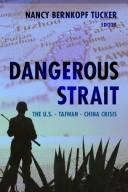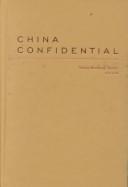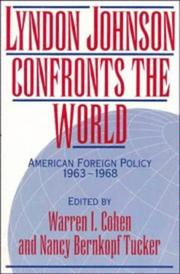| Listing 1 - 10 of 13 | << page >> |
Sort by
|
Book
ISBN: 9780674031876 0674031873 Year: 2009 Publisher: Cambridge Harvard university press
Abstract | Keywords | Export | Availability | Bookmark
 Loading...
Loading...Choose an application
- Reference Manager
- EndNote
- RefWorks (Direct export to RefWorks)
United States --- Taiwan --- China --- Foreign relations --- S26/0620 --- S26/0757 --- S26/0515 --- Taiwan--International politics --- Taiwan--Economic relations with the USA (incl. US aid) --- Taiwan--China's claim to Taiwan (and vice-versa) --- United States - Foreign relations - Taiwan --- Taiwan - Foreign relations - United States --- United States - Foreign relations - China --- China - Foreign relations - United States --- Taiwan - Foreign relations - China --- China - Foreign relations - Taiwan

ISBN: 0231135645 0231509634 Year: 2005 Publisher: New York Columbia university press
Abstract | Keywords | Export | Availability | Bookmark
 Loading...
Loading...Choose an application
- Reference Manager
- EndNote
- RefWorks (Direct export to RefWorks)
Today the most dangerous place on earth is arguably the Taiwan Strait, where a war between the United States and China could erupt out of miscalculation, misunderstanding, or accident. How and to what degree Taiwan pursues its own national identity will have profound ramifications in its relationship with China as well as in relations between China and the United States. Events late in 2004 demonstrated the volatility of the situation, as Taiwan's legislative elections unexpectedly preserved a slim majority for supporters of closer relations with China. Beijing, nevertheless, threatened to pass an anti-secession law, apt to revitalize pro-independence forces in Taiwan-and make war more likely. Taking change as a central theme, these essays by prominent scholars and practitioners in the arena of U.S.-Taiwan-Chinese relations combine historical context with timely analysis of an accelerating crisis. The book clarifies historical developments, examines myths about past and present policies, and assesses issues facing contemporary policymakers. Moving beyond simplistic explanations that dominate discussion about the U.S.-Taiwan-China relationship, Dangerous Strait challenges common wisdom and approaches the political, economic, and strategic aspects of the cross-Strait situation anew. The result is a collection that provides fresh and much-needed insights into a complex problem and examines the ways in which catastrophe can be avoided. The essays examine a variety of issues, including the movement for independence and its place in Taiwanese domestic politics; the underlying weaknesses of democracy in Taiwan; and the significance of China and Taiwan's economic interdependence. In the security arena, contributors provide incisive critiques of Taiwan's incomplete military modernization; strains in U.S.-Taiwan relations and their differing interpretations of China's intentions; and the misguided inclination among some U.S. policymakers to abandon Washington's traditional policy of strategic ambiguity.
China --- Taiwan Strait --- Taiwan --- United States --- Foreign relations --- Strategic aspects. --- S09/0610 --- S26/0515 --- S26/0620 --- China: Foreign relations and world politics--China and USA: since 1949 --- Taiwan--China's claim to Taiwan (and vice-versa) --- Taiwan--International politics --- Formosa Strait --- Tʻai-wan hai-hsia --- Taiwan haixia --- POLITICAL SCIENCE / International Relations / General.

ISBN: 9780231106313 0231106319 Year: 2001 Publisher: New York: Columbia university press,
Abstract | Keywords | Export | Availability | Bookmark
 Loading...
Loading...Choose an application
- Reference Manager
- EndNote
- RefWorks (Direct export to RefWorks)
In the past sixty years, relations between China and the United States have fluctuated wildly. Such divisive issues as human rights, the future of Tibet and Taiwan, trade imbalances, and illegal immigration have fueled intense debate over how the United States should deal with the most populous nation in the world. Nancy Bernkopf Tucker brings together a wide range of interviews on these and other issues, recorded by the Association for Diplomatic Studies and Training, with key players in the making and execution of U.S. policy towards China since World War II. Historical events usch as Nixon's trip to China, the Tiananmen Massacre, and the recurring Taiwan Straits crises come to life as never before. Portraits of the essential personalities in Sino-American relations emerge from the pages of China Confidential, including Mao Zedong, Henry Kissinger, Zhou Enlai, Ronald Reagan, Chiang Kai-shek, Chiang Ching-kuo, and Lee Teng-hui. This rich array of interviews provides the context for understanding the otherwise baffling diplomatic interaction between the United States and China, shedding light on the circumstances under which difficult and crucial decisions were reached and revealing the background and biases of the people who made and carried out those policies.
Diplomats --- Diplomats --- United States --- China --- United States --- United States
Book
ISBN: 9780231135658 Year: 2005 Publisher: New York (N.Y.) Columbia University Press
Abstract | Keywords | Export | Availability | Bookmark
 Loading...
Loading...Choose an application
- Reference Manager
- EndNote
- RefWorks (Direct export to RefWorks)
Book
ISBN: 9780231159241 Year: 2012 Publisher: New York Columbia university press
Abstract | Keywords | Export | Availability | Bookmark
 Loading...
Loading...Choose an application
- Reference Manager
- EndNote
- RefWorks (Direct export to RefWorks)
China --- United States --- United States --- Foreign relations --- Foreign relations --- Foreign relations
Book
ISBN: 0231053630 Year: 1983 Publisher: New York (N.Y.): Columbia university press
Abstract | Keywords | Export | Availability | Bookmark
 Loading...
Loading...Choose an application
- Reference Manager
- EndNote
- RefWorks (Direct export to RefWorks)
China --- United States --- Foreign relations
Book
ISBN: 0231528191 Year: 2012 Publisher: New York : Columbia University Press,
Abstract | Keywords | Export | Availability | Bookmark
 Loading...
Loading...Choose an application
- Reference Manager
- EndNote
- RefWorks (Direct export to RefWorks)
Nancy Bernkopf Tucker confronts the coldest period of the cold war-the moment in which personality, American political culture, public opinion, and high politics came together to define the Eisenhower Administration's policy toward China. A sophisticated, multidimensional account based on prodigious, cutting edge research, this volume convincingly portrays Eisenhower's private belief that close relations between the United States and the People's Republic of China were inevitable and that careful consideration of the PRC should constitute a critical part of American diplomacy. Tucker provocatively argues that the Eisenhower Administration's hostile rhetoric and tough actions toward China obscure the president's actual views. Behind the scenes, Eisenhower and his Secretary of State, John Foster Dulles, pursued a more nuanced approach, one better suited to China's specific challenges and the stabilization of the global community. Tucker deftly explores the contradictions between Eisenhower and his advisors' public and private positions. Her most powerful chapter centers on Eisenhower's recognition that rigid trade prohibitions would undermine the global postwar economic recovery and push China into a closer relationship with the Soviet Union. Ultimately, Tucker finds Eisenhower's strategic thinking on Europe and his fear of toxic, anticommunist domestic politics constrained his leadership, making a fundamental shift in U.S. policy toward China difficult if not impossible. Consequently, the president was unable to engage congress and the public effectively on China, ultimately failing to realize his own high standards as a leader.
International relations. --- China --- United States --- Foreign relations
Book
ISBN: 9780231528191 0231528191 9780231159241 0231159242 Year: 2012 Publisher: New York Columbia University Press
Abstract | Keywords | Export | Availability | Bookmark
 Loading...
Loading...Choose an application
- Reference Manager
- EndNote
- RefWorks (Direct export to RefWorks)
China --- United States --- Foreign relations
Digital
ISBN: 9780231528191 9780231159258 Year: 2012 Publisher: New York, N.Y. Columbia University Press
Abstract | Keywords | Export | Availability | Bookmark
 Loading...
Loading...Choose an application
- Reference Manager
- EndNote
- RefWorks (Direct export to RefWorks)

ISBN: 0521424798 0521414288 113917391X 9780521414289 9780521424790 Year: 1994 Publisher: Cambridge : Cambridge University Press,
Abstract | Keywords | Export | Availability | Bookmark
 Loading...
Loading...Choose an application
- Reference Manager
- EndNote
- RefWorks (Direct export to RefWorks)
This is the most comprehensive, perceptive, and nuanced review to date of the foreign policy of the Lyndon Johnson era. It demonstrates US concern not just with the Soviet Union, Europe, and nuclear weapons issues, but the overwhelming preoccupation with Vietnam which shaped policy throughout the world. During this period, Johnson also faced a series of emergencies ranging from turmoil in the Congo, to war in the Middle East, to a perceived communist challenge in the Caribbean, to a lingering hostage crisis in Asia. Using the most recently declassified documents, it explains in thoroughly readable prose the intricacies of the foreign policy dilemmas that forced Johnson's Great Society domestic agenda into retreat.
Johnson, Lyndon Baines, --- United States --- Foreign relations --- Arts and Humanities --- History --- Johnson, Lyndon B. --- Chan-sên, --- Dzhonson, Lindon, --- L. B. J. --- ג'ונסון, לינדון --- ジョンソン, --- Johnson, L. --- Čhō̜nsan, Lindō̜n Bī., --- Johnson, Lyndon Baines, - 1908-1973 --- United States - Foreign relations - 1963-1969
| Listing 1 - 10 of 13 | << page >> |
Sort by
|

 Search
Search Feedback
Feedback About UniCat
About UniCat  Help
Help News
News